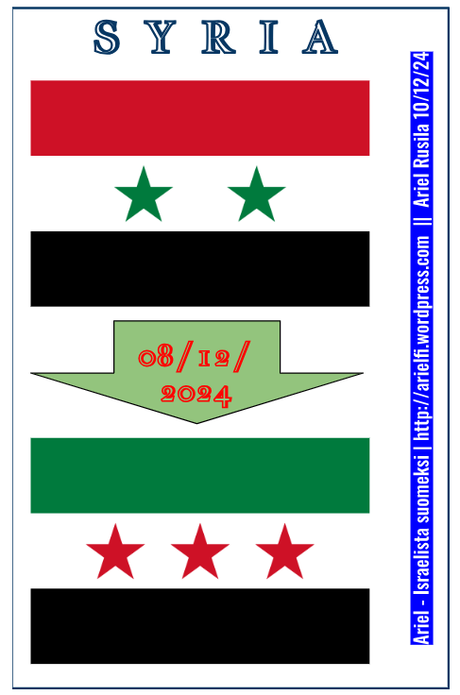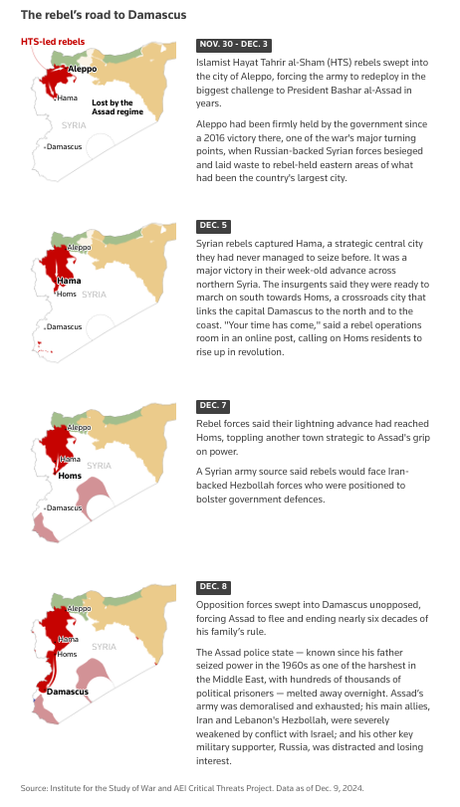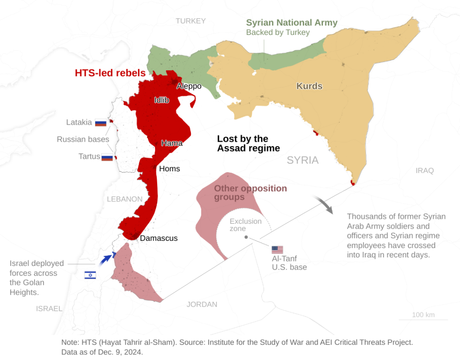
In Assad’s flag, the red represents the blood shed in the Syrian revolution. White is for peace. Black symbolizes Arab oppression. The green stars in the middle represent Syria and Egypt – the two founders of the United Arab Republic (1958-1961). In the opposition groups’ flag, the red has been replaced by green, and the three red stars represent Syria’s three main regions: Aleppo, Damascus and Deir el-Zor. The flag originally flew during the country’s struggle for independence from France.
" aria-describedby="caption-attachment-7625" data-orig-size="487,736" sizes="(max-width: 233px) 100vw, 233px" data-image-title="flagS" data-orig-file="https://arirusila.wordpress.com/wp-content/uploads/2024/12/flags.png" data-image-description="" data-image-meta="{"aperture":"0","credit":"","camera":"","caption":"","created_timestamp":"0","copyright":"","focal_length":"0","iso":"0","shutter_speed":"0","title":"","orientation":"0"}" width="233" data-medium-file="https://arirusila.wordpress.com/wp-content/uploads/2024/12/flags.png?w=199" data-permalink="https://arirusila.wordpress.com/2024/12/11/aspects-of-al-assads-quick-overthrowe-in-syria/flags/" alt="flagS" height="352" srcset="https://arirusila.wordpress.com/wp-content/uploads/2024/12/flags.png?w=233&h;=352 233w, https://arirusila.wordpress.com/wp-content/uploads/2024/12/flags.png?w=466&h;=704 466w, https://arirusila.wordpress.com/wp-content/uploads/2024/12/flags.png?w=99&h;=150 99w, https://arirusila.wordpress.com/wp-content/uploads/2024/12/flags.png?w=199&h;=300 199w" class="alignnone wp-image-7625" data-large-file="https://arirusila.wordpress.com/wp-content/uploads/2024/12/flags.png?w=450" />In Assad’s flag, the red represents the blood shed in the Syrian revolution. White is for peace. Black symbolizes Arab oppression. The green stars in the middle represent Syria and Egypt – the two founders of the United Arab Republic (1958-1961). In the opposition groups’ flag, the red has been replaced by green, and the three red stars represent Syria’s three main regions: Aleppo, Damascus and Deir el-Zor. The flag originally flew during the country’s struggle for independence from France.
In Syria, an operation launched by rebels just two weeks ago quickly achieved its first goal – the capture of Syria’s second city, Aleppo. From there, a little over a week later, the rebel alliance reached Damascus and ended the half-century-long rule of the al-Assad family on Sunday, December 8, 2024. How the blitzkrieg succeeded.
Al-Assad’s ouster came at a time when his allies were unable to muster the decisive defenses that had sustained him for years. Weakened by Israeli strikes, Iranian- and Hezbollah-backed forces were unable to build a proper ground defense, and although Russian fighter jets attacked the militants early in their campaign, Moscow’s military support for the rebels – already strained by the war in Ukraine – evaporated as the opposition’s advance accelerated.
In November and December 2024, several Israeli airstrikes targeted Syrian weapons depots, significantly altering the military dynamics in the region. Before the rebel offensive, the strikes were aimed at denying Hezbollah advanced weapons and dismantling possible chemical weapons facilities. An intensified air campaign followed the collapse of the Assad regime, and the US also carried out similar strikes on ISIS’s expanded territory.
Below is a timeline of the change of power compiled by Reuters:

In addition to the decline in external support for al-Assad’s army, internal reasons for the rebels’ success, including morale, can also be found, such as:
- Simultaneous attacks by the rebels on multiple fronts, including Hayat Tahrir al-Sham (HTS), the Syrian Democratic Forces (SDF) and Turkish-backed groups.
- More than a decade of war has caused physical and mental fatigue among soldiers; years of war, increasing casualties and the loss of key positions have weakened soldiers’ morale.
- Corruption and poor strategic decisions have undermined trust in the military hierarchy.
- Syria’s collapsing economy has made it challenging to procure supplies, pay soldiers or maintain operations.
- Strategic isolation: The rebels gained a strategic advantage by cutting off the government’s supply lines, especially in critical areas such as Aleppo and Homs, and thus the connection between the coast and Damascus.
The map below shows the situation on December 9, 2024:

Source: Reuters, among others

